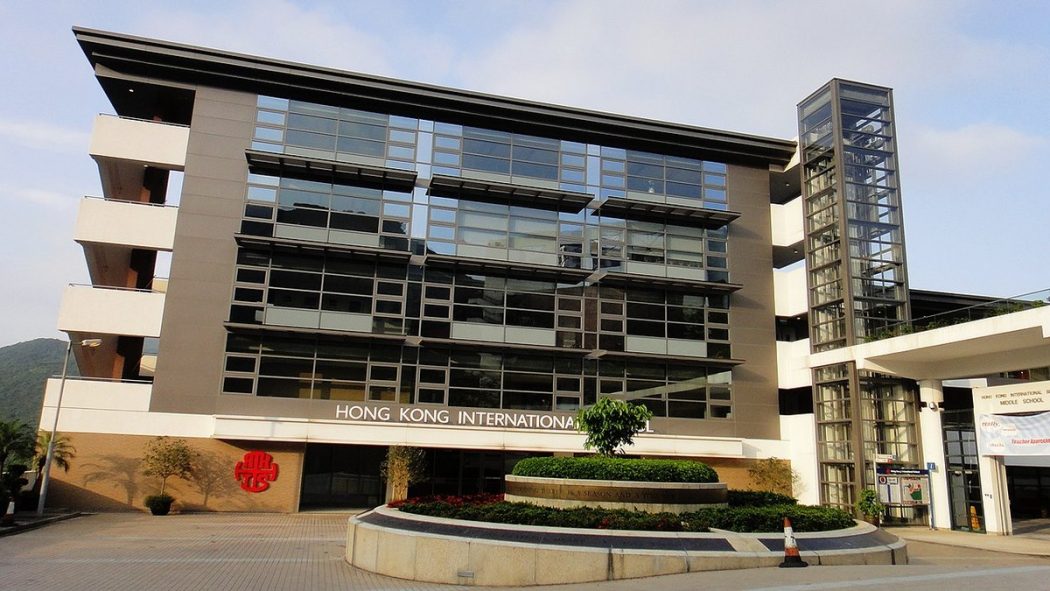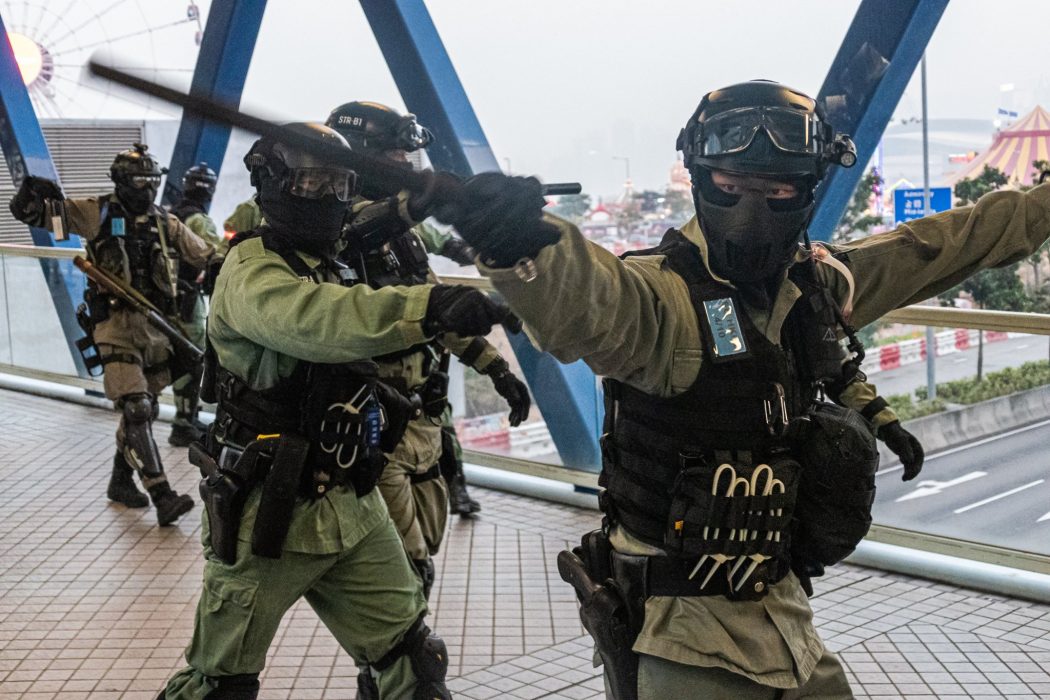Sam and his toddler daughter often leaf through a storybook together at home. Sometimes the little girl listens intently as her dad reads, but she also likes to chip in with her own interpretations of the pictures on each page. Her current favourite is the tale of a baby tiger learning kung fu.
These calm, joyful moments provide a temporary respite from the overwhelming sense of anxiety Sam feels about his only child’s future in Hong Kong. She is taking her first steps into the world at a time when the city’s freedoms are under an unprecedented onslaught from Beijing. Her father fears what that will mean for her as she grows up.

Hong Kongers are increasingly weighing up how best to protect their children as Beijing imposes control on the semi-autonomous city through a new national security law.
China says the legislation will combat terrorism, secession and subversion. Many in Hong Kong see it as the death knell for freedom of speech, thought and expression.
Parents fear the city’s education system will become a propaganda tool for the Chinese Communist Party, preventing their children from developing free thinking. They worry about their physical safety too as police crack down hard on young dissenters.
Some parents are trying to create a safe haven for their children in Hong Kong as best they can, others want to send them abroad.
After seeing children caught up in clouds of police tear gas during city-wide anti-government protests last year, Sam, his wife and their daughter moved from the urban district where they lived to a flat in a quiet suburb. They hope their toddler will be safer there and are also making longer-term plans.

Both parents, who are in their 30s, already work full-time but Sam recently took a second job so his daughter can attend a private international school in Hong Kong. He barely sleeps, working at a media firm by day and as a translator at night, motivated by wanting to give his daughter the best start in life.
Sam fears that the public system in which he was educated will descend into an ideological battleground as China seeks to push its nationalist message to children. He hopes the private sector will be better protected from political interference.
“The government has already been trying to instill biased patriotic values, not critical thinking, at local schools,” Sam told HKFP. “This is not what we expect from modern education. No modern education should turn a child into a machine.”
‘There’s no turning back’
Concern over censorship in schools was stoked last month when Hong Kong’s education bureau sought to scrap a university entrance exam question about Japan’s occupation of China after it was blasted by mainland officials.

Hong Kong has a much freer education system than mainland China, but since the student-led pro-democracy Umbrella Movement of 2014, schools and universities have come under suspicion from the Hong Kong government and Beijing as a breeding grounds for activists.
Sam hopes that by rejecting the state system his daughter will enjoy “a stress-free environment where she can learn happily”.
An international school would also better prepare his daughter for if the family decides to leave Hong Kong and make a new life elsewhere, he said.
“It’s sad not to educate her at a local school because her native language is Cantonese, but we need to think of our options. It’s possible that we’re going to leave our home. I want her to feel that she is international, that she is a global citizen,” he told HKFP.
Immigration consultants said they received a flood of calls from residents wanting to move away after the national security law was announced. There has also been renewed interest in British National Overseas passports after Britain announced extended visa rights for BNO holders last month and promised a path to UK citizenship.

But leaving Hong Kong is not an easy decision for many parents. New father Paul, who is 31 and owns a small business, worries that it would be difficult to uproot his young family and find a good job elsewhere. Even though his son is less than two months old, he is already thinking about the best path for his future.
Like Sam, he wants his child to go to an international school in Hong Kong. He then hopes to send him abroad to study, despite the immense financial strain that would bring.
“I was educated very happily in a local school and originally I wanted my son to grow up in Hong Kong and stay in Hong Kong. Sending him to an international school and to study abroad will cost a huge amount and will affect our quality of life as a family,” he said.
“However, Hong Kong is changing for the worse and there’s no turning back from what I can see. If children could be properly educated on history and allowed critical thinking, it would be fine, but the Hong Kong and Chinese government just want to portray the good side of China all the time.”

Paul believes a skewed curriculum based on China’s message is inevitable and that is not what he wants for his son. “At least getting out of the local system is an option for us,” he added. “Not all parents will have that choice.”
‘One day the police will come for him’
While Sam and Paul’s journey as parents is just beginning, Mrs Chan lives in fear that her grown-up son, a university graduate in his early 20s, will be hurt or arrested on the streets of Hong Kong, where he regularly protests. She has tried to convince him to move abroad to live with other members of their family, but he does not want to leave the city.
Choking back tears, Mrs Chan described how the crackdown on Hong Kong’s freedoms and young protesters in particular has changed her close relationship with her son. “Last summer we used to talk about politics and the protests, but now he doesn’t tell me where he’s going any more. He’s angry at everything and everyone,” she told HKFP.

Mrs Chan says that communication between them worsened after her son watched footage of the police siege at Hong Kong Polytechnic University in November, in which students were trapped inside the campus for days and injured as police fired tear gas and rubber bullets. From then on his mood darkened and he became increasingly frustrated.
She still harbours hope that she will convince him to leave the city, but it is not a conversation her son wants to have.
“When we first talked about it months ago he said he didn’t want to be a deserter. Now he just gets angry every time I raise the subject of emigration, telling me: ‘If you want to go, you go,’” she said.
Mrs Chan has also attended protests in Hong Kong but fears for her son more than for herself because of his age. Young people, students and school children are regularly rounded up by police at demonstrations.

“So far he’s never been arrested, he’s lucky,” Mrs Chan told HKFP. “It’s dangerous now for young people in Hong Kong. Maybe one day the police will come to my home looking for him. That’s a big worry, a big fear, for me.”
She does not want to start again in another country but feels hopeless about what lies ahead for her son if he stays with her in Hong Kong. “There is no future in Hong Kong for young people,” Mrs Chan said.
‘Things are changing so quickly’
Mounting concern about the vulnerability of young people in the city is making some Hong Kongers think twice about whether they want to be parents at all. Miss Tam, in her early 30s, said that she had always imagined having two children but is now not sure she wants to become a mother.
“I really want to have a kid, but whether or not I will have the ability to secure a good education or living environment, I can’t say. Things are changing so quickly and the political environment is deteriorating at such speed, it’s beyond anything we expected,” she told HKFP.
If she were to decide to have a child, she would consider going to Canada to give birth to obtain citizenship for her baby, something one of her friends has already done, she said.
Sam shares Miss Tam’s sense of shock at the speed and brutality of change in Hong Kong. He says the imposition of the national security law and the way it was dictated from Beijing, bypassing Hong Kong’s institutions, was the “nail in the coffin” for the city.
“We’ve gone back to basics, we’re fighting for survival. It’s not a good feeling,” he said. Envisioning a life for his daughter and his family outside of the city he calls home is painful, but he increasingly sees it as a necessity.

“I would love her to stay in Hong Kong if it was a good place, but we need to look at our options,” he explained. “If we’re being governed in this way, we really need to think of a way out.”
All names in this article have been changed at the request of the interviewees
